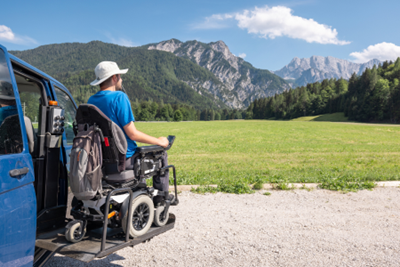- Despite contributing $6.8 billion annually to the tourism industry, Australians with disability continue to face barriers in accessing inclusive travel
- In fact, approximately 18.5 million trips are taken each year by people living with disability, yet accessibility remains an afterthought in industry funding and planning
- In line with the National Tourism Awards (21st March), Spinal Life Australia is urging the declaration of 2026 as the National Year of Accessible Tourism, ensuring Australia is at the forefront of inclusive tourism
Australians with disability spend an estimated $6.8 billion annually on tourism and travel domestically—a significant contribution to the national tourism industry1. In fact, approximately 18.5 million trips are taken each year by Australians living with a disability, accounting for almost a quarter (23%) of all domestic trips1. Yet, despite this strong demand, accessible tourism remains an afterthought in industry planning, with little direct investment or strategy integration to ensure inclusivity.
As the nation’s tourism industry prepares to gather in Adelaide for the National Tourism Awards on the 21st of March, Spinal Life Australia is continuing to call for 2026 to be declared the National Year of Accessible Tourism, ensuring that accessibility is embedded in Australia’s tourism future—not sidelined.
With Australians set to head to the polls this year, Dane Cross, Chief Operating Officer of Sporting Wheelies (powered by Spinal Life Australia) says accessible tourism must be highlighted as a priority election issue and not a missed opportunity.
Mr Cross who lives with quadriplegia and will be attending the awards, expresses frustration over the lack of tangible progress in accessible tourism strategies.
“After all the talk following the Year of Accessible Tourism in Queensland 2023/24, I’m disappointed by how quickly accessibility and inclusion seem to have been brushed aside,” Mr Cross says. “Accessibility is still viewed as a transport issue or a vague aspiration, rather than a core part of tourism planning. This is a missed opportunity. Accessible tourism must be a major focus in our upcoming elections, and Australians should be demanding action from our leaders.
“With one in five Australians living with disability2, their needs are still being overlooked in tourism planning. Governments must invest in accessible tourism, embed accessibility in strategies, and provide meaningful financial incentives for inclusive experiences,” Mr Cross adds.
While Spinal Life Australia welcomes the Federal Government’s recent $17.1 million investment under the Commonwealth Accessible Australia initiative, aimed at improving accessibility in community spaces such as beaches and national parks across Australia, the organisation stresses that accessibility needs to be embedded in long-term strategies and not treated as a one-off funding solution.
“This investment is a step in the right direction, but to truly capitalise on the economic potential of accessible tourism, accessibility must be integrated into long-term, sustained planning. We know from our own advocacy efforts that without professional advice and industry mindset shifts, accessibility risks becoming tokenistic. Businesses and local councils want to do better, but they need support to get it right,” Mr Cross continues.
“With Brisbane 2032 on the horizon, the government must view this as a pivotal moment to position Queensland as Australia’s most accessible tourism destination, ready to capture a bigger slice of the international tourism pie. We have a chance to show the world what accessible tourism truly looks like. Let’s make accessibility part of Australia’s legacy—not just for 2032, but for generations to come.”
Mr Cross also emphasises that meaningful financial commitments are needed to drive real change, not just conversation.
“The time for talk is over. Without significant investment, strategies and good intentions alone won’t create lasting change. The government must commit substantial funding to help businesses improve accessibility. That’s why Spinal Life Australia has put forward a pre-budget submission, calling for $354 million to support businesses in upgrading their accessibility offerings. Without this investment, we risk losing momentum and failing to build the inclusive tourism industry Australia urgently needs,” Mr Cross says.
Dedicated funding streams for accessible tourism infrastructure and financial incentives, such as tax breaks for operators prioritising accessibility, are essential. Furthermore, industry-wide education and training programs will also help shift attitudes and improve service delivery, expanding successful programs like the Access Accelerator to support businesses making necessary improvements.
“Accessibility is not just about compliance—it is about economic opportunity and social inclusion. Aligning accessible tourism initiatives with strategies and events such as Brisbane 2032 will position Australia as a global leader in inclusive travel and create a long-term, sustainable approach to accessibility,” Mr Cross concludes.
Ahead of the National Tourism Awards, now is the time to recognise that true industry excellence must include accessibility. While the awards celebrate innovation and achievement, Spinal Life Australia calls on decision-makers to make accessible tourism a priority. The organisation is urging the Federal Government to declare 2026 the National Year of Accessible Tourism, ensuring no traveller is left behind. Embedding accessibility into tourism policy is key to creating a truly inclusive travel experience for all. For more information, visit https://www.spinal.com.au/.
